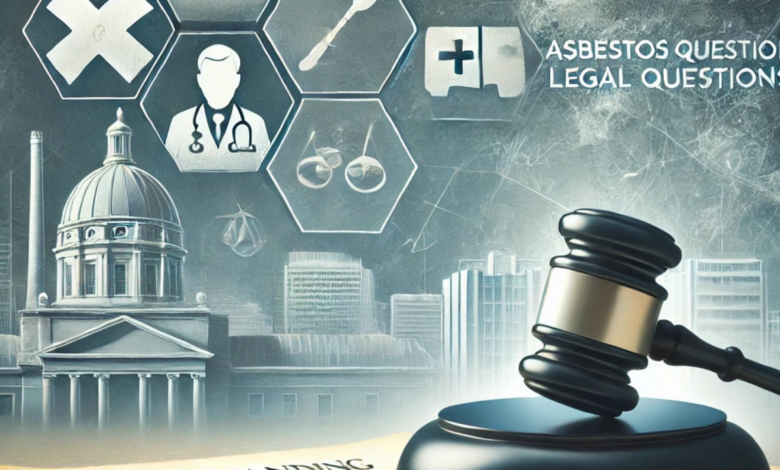Understanding Keyrichmond Asbestos Legal Questionword: A Richmond Legal Overview

Asbestos, a naturally occurring mineral once hailed for its durability and fire-resistant qualities, has left a complex legacy. Despite its usefulness in industries such as construction, shipbuilding, and automotive manufacturing, asbestos exposure is now known to cause serious health risks, including mesothelioma, lung cancer, and asbestosis. Richmond, like many other regions, faces unique challenges and questions surrounding asbestos legal claims, regulations, and compensations. This article aims to provide a comprehensive overview of asbestos-related legal concerns in Richmond through a lens we’ll term “Keyrichmond Asbestos Legal Questionword.”
What Is Asbestos, and Why Is It Dangerous?
Asbestos refers to a group of six fibrous minerals found naturally in the environment. Although the fibers are resilient, they are also hazardous when inhaled or ingested. The fibers can lodge themselves into the lungs and other tissues, leading to chronic respiratory issues and even cancer. Asbestos exposure is particularly dangerous because it often takes years—sometimes decades—for symptoms of related illnesses to develop.
The use of asbestos was restricted in the U.S. in the 1970s. However, buildings constructed before these regulations may still contain asbestos materials, posing risks to occupants. Individuals who have worked in asbestos-heavy industries (e.g., construction, shipyards, and automotive repair) are particularly at risk, as well as people who have lived near facilities using asbestos.
Understanding the Legal Landscape for Asbestos in Richmond
The Keyrichmond Asbestos Legal Questionword includes an array of considerations for those affected by asbestos exposure in Richmond. From understanding legal rights to identifying responsible parties and pursuing compensation, asbestos law can be complex. Below are key aspects of the asbestos legal landscape in Richmond.
1. Asbestos Regulations in Richmond
Federal agencies such as the Environmental Protection Agency (EPA) and the Occupational Safety and Health Administration (OSHA) have established guidelines to protect individuals from asbestos exposure. While Richmond adheres to these federal regulations, the city and state may have additional laws in place that govern asbestos management, remediation, and legal rights.
For example, Richmond requires strict asbestos removal procedures to minimize airborne exposure, and property owners may be liable if they fail to follow these guidelines. Familiarizing oneself with local laws and regulations is essential for understanding potential legal avenues for compensation.
2. Determining Liability in Asbestos Cases
Identifying who is liable in asbestos exposure cases can be complicated. Employers, product manufacturers, and property owners may all share some responsibility, depending on the specifics of the exposure. In many cases, asbestos claims involve multiple parties, including former employers or manufacturers who supplied asbestos-containing products.
Lawyers specializing in asbestos litigation can assist in identifying liable parties, gathering necessary documentation, and building a compelling case. It’s crucial to work with attorneys who understand Richmond’s legal environment and have experience with asbestos claims.
3. Types of Asbestos Legal Claims
There are several types of legal claims that individuals in Richmond may consider when seeking compensation for asbestos exposure. These claims typically fall into one of the following categories:
- Personal Injury Claims: These claims are filed by individuals diagnosed with an asbestos-related disease, seeking compensation for medical expenses, lost wages, and emotional distress.
- Wrongful Death Claims: In cases where a loved one has passed away due to asbestos exposure, family members can file a wrongful death claim.
- Product Liability Claims: If exposure occurred due to a defective product, the product’s manufacturer may be held responsible.
- Premises Liability Claims: If asbestos exposure occurred on a specific property, the property owner might be liable for failing to manage or disclose asbestos hazards.
Each type of claim has its own specific requirements, and working with an attorney can help ensure that all necessary documentation is collected.
4. The Statute of Limitations for Asbestos Claims in Richmond
One of the most critical aspects of asbestos litigation is the statute of limitations, which determines the timeframe within which claims must be filed. In Richmond, as in most jurisdictions, asbestos-related cases generally must be filed within a certain number of years from the date of diagnosis or discovery of illness. For personal injury claims, this is typically two years from the date of diagnosis, and for wrongful death claims, two years from the date of death.
Because asbestos-related diseases have long latency periods, affected individuals may not receive a diagnosis until decades after exposure. Richmond’s courts recognize this delay and may extend the statute of limitations in certain cases, depending on when the illness was discovered. Consulting with a Richmond-based asbestos attorney can help clarify specific deadlines and exceptions.
5. Pursuing Compensation for Asbestos-Related Illnesses
Compensation for asbestos-related illnesses may cover medical expenses, lost income, pain and suffering, and other damages. The amount and type of compensation depend on the severity of the illness, the liable parties, and the type of claim filed.
- Asbestos Trust Funds: Many companies that were responsible for asbestos exposure have established trust funds to provide compensation to victims. These funds are often an option when the responsible company has declared bankruptcy.
- Settlements: Most asbestos cases settle out of court, providing victims with compensation without the need for a lengthy trial.
- Verdicts: In cases that go to trial, a judge or jury determines the outcome and amount of compensation. Trials can lead to higher compensation but also carry more uncertainty.
Working with a lawyer experienced in Richmond asbestos cases can help navigate these options and secure appropriate compensation.
Frequently Asked Questions (FAQs)
- What is Keyrichmond Asbestos Legal Questionword? Keyrichmond Asbestos Legal Questionword refers to the key legal questions and concerns surrounding asbestos claims and compensation within the Richmond area. It covers local asbestos regulations, liability, claims, and compensation options.
- Who can be held liable for asbestos exposure in Richmond? Various parties can be held liable, including employers, property owners, and manufacturers of asbestos-containing products. The liable party depends on the specific circumstances of the exposure.
- How long do I have to file an asbestos claim in Richmond? The statute of limitations in Richmond typically allows two years from the date of diagnosis for personal injury claims and two years from the date of death for wrongful death claims. Certain exceptions may apply based on when the illness was discovered.
- What types of compensation are available for asbestos-related illnesses? Compensation options include asbestos trust funds, settlements, and court verdicts. Victims may be eligible for reimbursement of medical costs, lost wages, and emotional damages.
- How can a Richmond-based attorney help with an asbestos claim? An experienced asbestos attorney can help identify liable parties, gather evidence, understand local regulations, and navigate the compensation process, increasing the likelihood of a successful claim
You May Also Read:https://techupmagazine.com/exhentaime/



